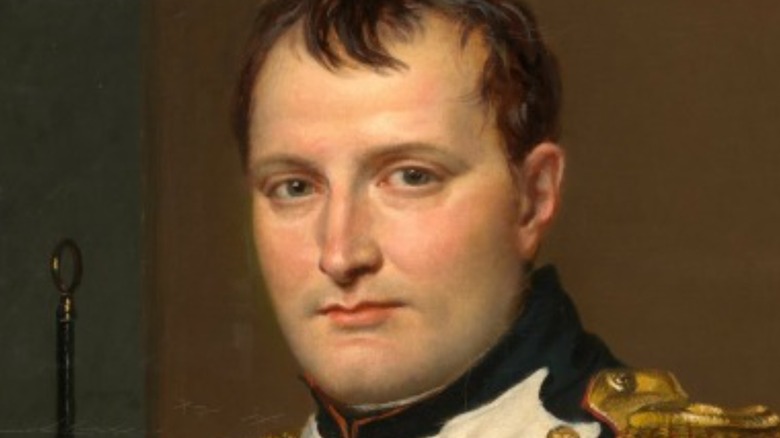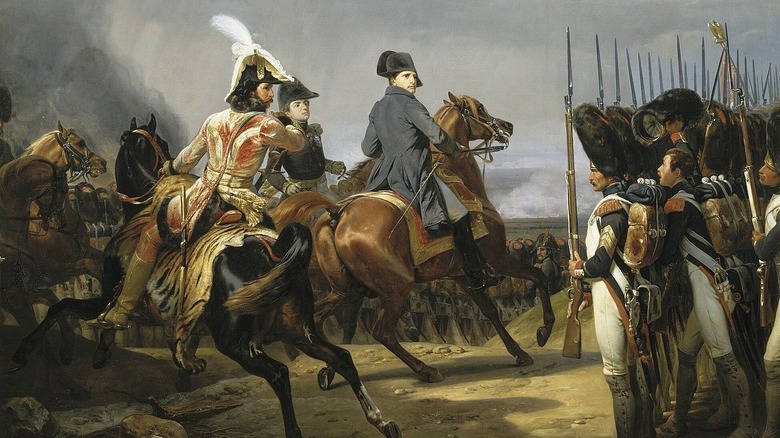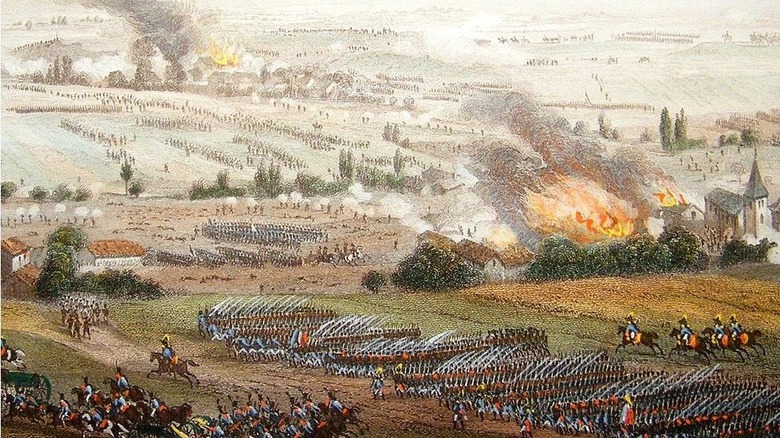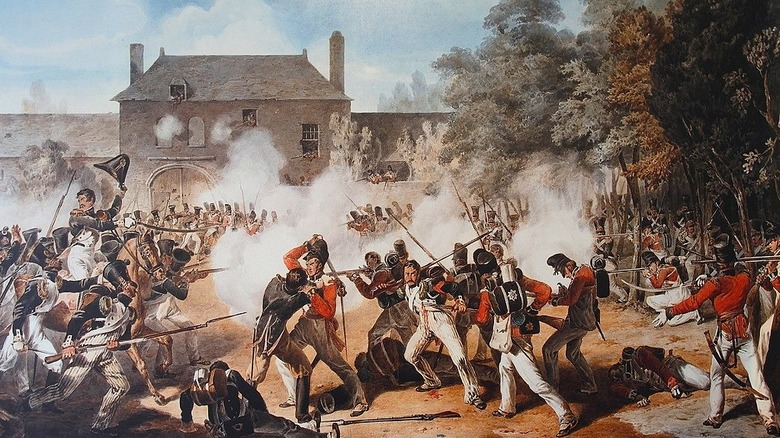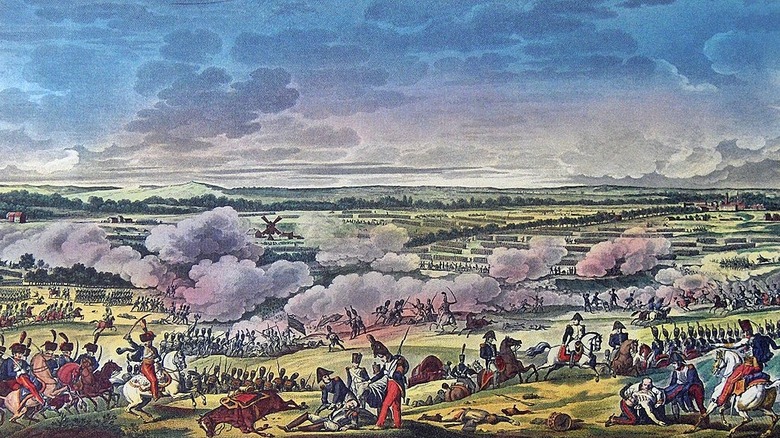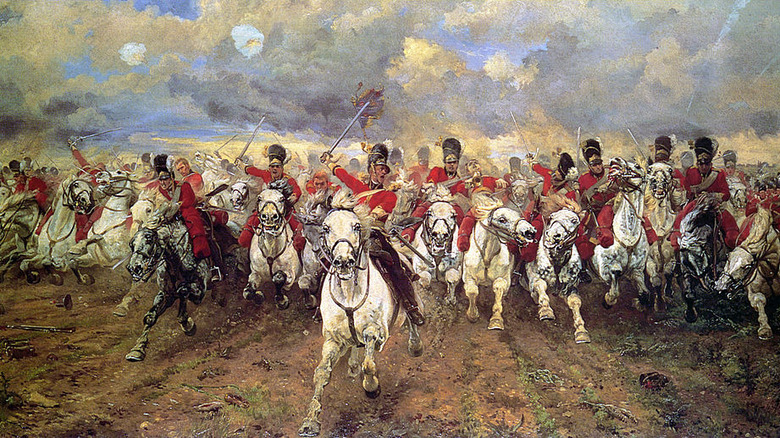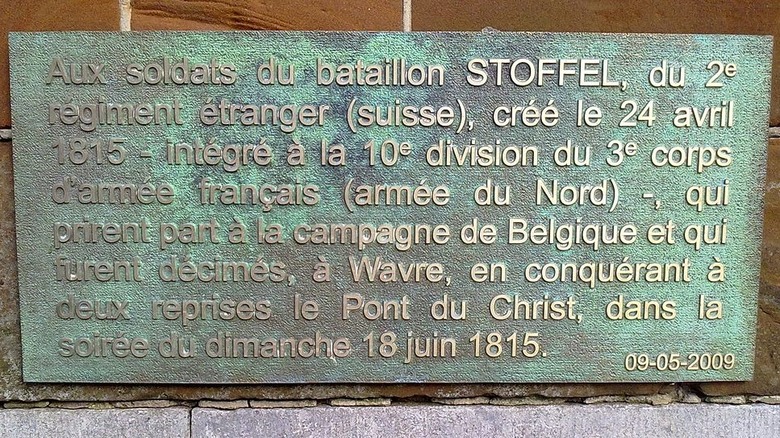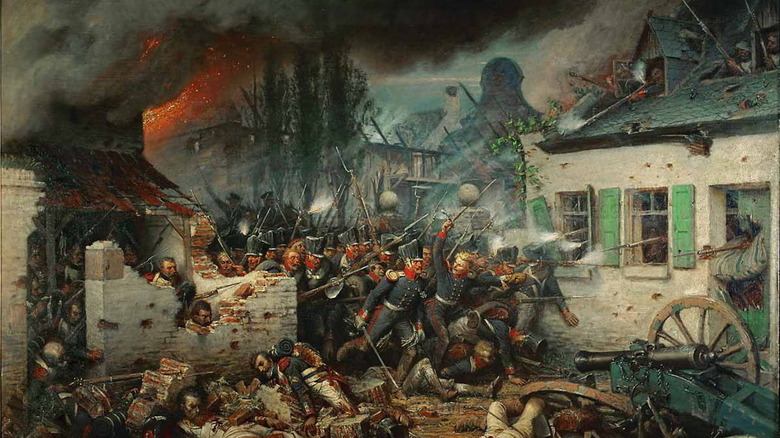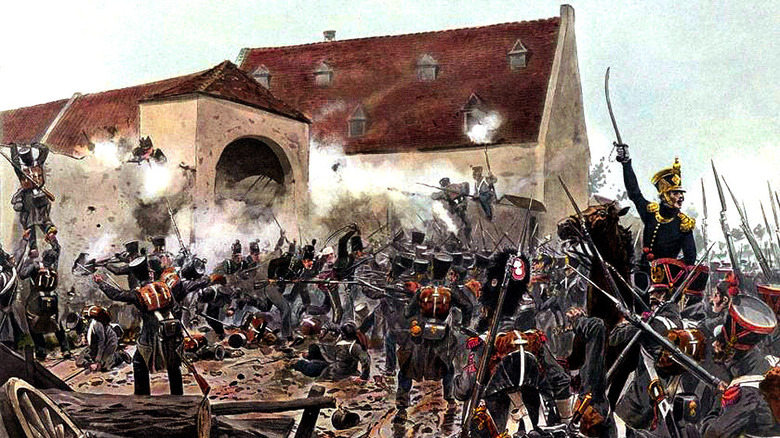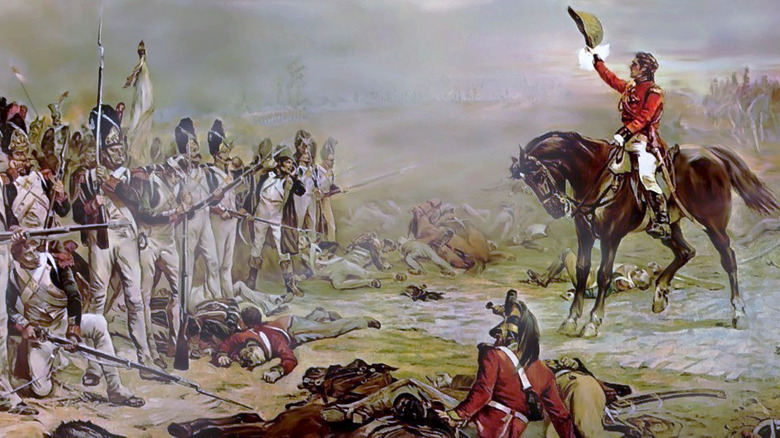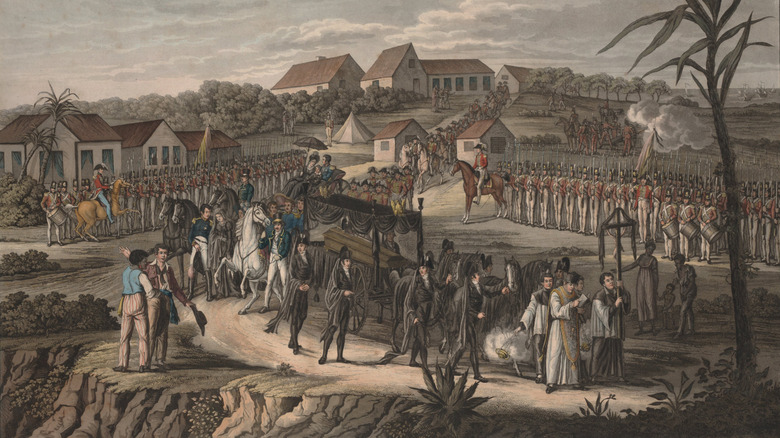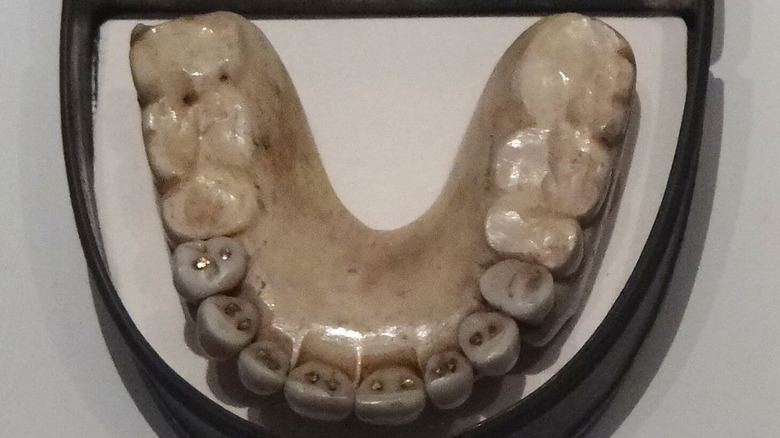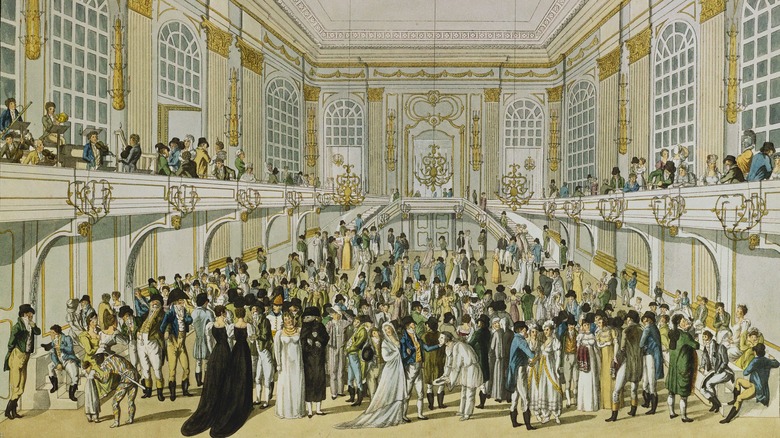The Battle Of Waterloo Finally Explained
In 1814, a Russo-Prussian-Austrian coalition defeated Napoleon Bonaparte at the Battle of Leipzig and forced the emperor into captivity on the tiny Italian island of Elba. Undeterred, Napoleon escaped exile a year later and found his way back to Paris, where he mustered his old veterans into a new army to confront the inevitable coalition that would rise to oppose him before he could consolidate his position. Nearly all of Europe opposed Napoleon, but only Britain, Prussia, the Netherlands, and a few small German states mustered to fight him. The two sides met in Belgium near a village called Waterloo.
Despite his confidence and the fact that he was in possession of an elite army, almost everything that could go wrong for Napoleon did. Yet, he pushed his enemies to their breaking point and nearly defeated them, the key word being "nearly." This is the Battle of Waterloo finally explained.
Opposite expectations
According to Britannica, Napoleon's 72,000-strong army was the best-drilled and disciplined force of its day, consisting of veterans of wars from Spain to Russia, where they survived the brutal winter in 1812. Napoleon was supremely confident that his forces would steamroll the allies. On the morning of June 18, 1815, just before the battle, he is famously said to have stated that he would eat the British army for breakfast.
Napoleon had good reason to be confident. According to the National Army Museum, the heterogenous British-led army of 68,000 opposing him was described by its own commander, Sir Arthur Wellesley, Duke of Wellington, as "an infamous army, very weak and ill equipped." There was some truth to Wellesley's claims. The British Army's veteran troops had mostly been deployed to the United States to fight the War of 1812. Only a fraction of the soldiers at Waterloo had any battle experience, mostly from the Spanish Peninsular War in 1808. Wellesley made up the numbers with the recently reconstituted Dutch army and allied forces from Germany, but these troops paled in quality to the French.
Despite the odds, the weather favored the allies. The undersupplied French army faced rainy weather and muddy roads and had to sleep in the open. Had it not been for Napoleon's presence, they might have refused to fight altogether. Wellesley's one chance to win would come from exploiting the weather and defensive ground, but he needed an ally if he was going to hold off Napoleon's hardened soldiers.
The Prussian wild card
The only ally Wellesley could rely on was the Prussian army of Gebhard von Blücher, which had marched into Belgium to link up with the British. However, Napoleon had defeated Prussia at Ligny two days before Waterloo, making it uncertain if these troops would be able to join Wellesley in the field. Napoleon, in his overconfidence, was of this mindset, discounting the possibility and leaving the responsibility of shadowing the Prussians to his marshal, Emmanuel de Grouchy.
If Wellesley could rely on the Prussians, he would add at least an extra 50,000 men to his forces, allowing him to overwhelm Napoleon with sheer numbers. Although the rank-and-file of the Prussian army were low-quality recruits from recently annexed areas, the Warfare History Network (via National Interest) notes that a superb officer corps allowed the army to function despite its many problems. Wellesley anxiously awaited Blücher's movements, upon which his decision to stand and fight Napoleon depended.
After Ligny, Blücher's forces retreated in good order, unmolested by the French. Nineteenth-century historian William Siborne noted that crucially for the outcome of Waterloo, the Prussians marched toward the town of Wavre to link up with Wellesley instead of retreating eastward into Prussian territory, as Napoleon had expected. Blücher reported that he would support the Anglo-Dutch army if Wellesley could hold Napoleon long enough for his forces to arrive. With this news, Wellesley's forces struck a defensive position on the Mont-Saint-Jean ridge and awaited Napoleon's arrival.
The battle that was not meant to be
The opening shots of the Battle of Waterloo resulted from Napoleon's overconfidence. According to Project Hougoumont, Wellesley had left around 3,000 soldiers on his right around the fortified farmstead of Hougoumont. Napoleon sought to dislodge the garrison and force Wellesley out from behind his heavily fortified position. Napoleon's brother Jerome led the assault with 13,000 men.
Eyewitnesses, recorded in Edward Cotton's "A Voice from Waterloo," described heroic defense of the farmstead as French soldiers swept the mostly Dutch defenders from the surrounding fields. As the attackers approached the walls, the defenders inexplicably shot them from behind it. The outnumbered defenders had ingeniously removed bricks from the lower part of the wall, creating slits that they could fire through. Since the wall had hedges against it, though, the slits were hidden from view. The continuous fire forced the French to attack the gates of the farmstead, with a handful managing to briefly penetrate the North Gate. Brutal hand-to-hand fighting with axes, swords, and bayonets ensued, and all of the French attackers were killed.
Napoleon had not intended for Hougoumont to escalate. The attack was a diversion to draw units away from Wellesley's center, but the British commander did not take the bait. Scottish colonel James MacDonnell received few reinforcements with orders to defend the position to the death. Wellesley declared MacDonnell the "bravest man in the British Army" and gave him £1,000 for his heroism.
The main assault
Although Hougoumont fell through, there was a clear logic to Napoleon's strategy. Edward Cotton noted that the large attack on the farmstead had hoped to draw Wellesely's troops away from the center-left of his line, precisely where Napoleon intended to strike. If Napoleon could break Wellesley's center-left, the British army would be isolated from its Prussian allies. Napoleon could then destroy his enemies in two separate battles and march on Brussels, where the British were headquartered.
The debacle at Hougoumont derailed Napoleon's plans, but he ordered the main attack to begin anyway. Prussian forces were on their way, and Napoleon could not risk their arrival. At 1 p.m., Jean-Baptiste Drouet, Comte d'Erlon, led the main assault against Wellington's line, with the main focus on the farmstead of La Haye Sainte. The odds seemed stacked against Napoleon this time. French forces faced an uphill attack in less-than-ideal conditions.
According to The Waterloo Association, heavy summer rains had caked the field in thick mud. A French artillery barrage failed to dent the British line as cannon balls got stuck in the mud and failed to bounce among their targets. French cavalry were bogged down, dampening the effectiveness of their charges and allowing the defenders to pick them off. If the French attack against Hougoumont failed, then the attack against the main defensive position should have been a disaster. Instead, Napoleon's forces nearly succeeded, driving Wellesley's men back and nearly breaking the allied line. At this crucial juncture, a reckless British cavalry officer saved the day.
The drama behind the charge of the Scots Greys
Henry Paget, Earl of Uxbridge, was an unlikely savior. Paget and Wellesley personally disliked each other. Paget's affair with Wellesley's sister-in-law had created a scandal among the English nobility that besmirched the Duke of Wellington's reputation. Because of the tension between them, Wellesley specifically requested to have Paget reassigned away from Waterloo. Instead, the Duke of York, who hated the Duke of Wellington, made Paget Wellesley's second-in-command. Ironically, this conflict within the British command saved Wellesley's army at a crucial juncture.
As the French forces drove the allies back, despite the mud and rain, the British line began to cave. Paget quickly gathered the British heavy cavalry, led by the elite Scots Greys, and formed up behind the crest of the hill. The British cavalry was well-trained, but some of the units had not seen combat since 1795, compared to the veteran French cavalry. Paget, in the heat of the moment, decided to charge downhill, and with momentum on their side, the British cavalry broke d'Erlon's infantry and threw them back across the field.
The cavalrymen pursued the fleeing enemy but were cut down in a French cavalry counterattack. Although they sustained terrible casualties, the British troopers had bought Wellesley time to rally his men and strengthen his center. Paget did not emerge unscathed. According to the BBC, he lost his right leg, but his bravery earned the respect of his contemporaries, including Wellesley himself.
Grouchy's blunder
Paget's charge had saved Wellesley's forces from defeat — temporarily. Wellesley still needed Prussian forces to arrive, or the next French attack would break his center. Prussian forces had suffered delays, but a colossal tactical error resulting from Napoleon's own handwritten orders would hand them a lifeline.
Prussian forces marched for Waterloo on the morning of June 18 from the town of Wavre. As noted by William Siborne, however, a major fire broke out in Wavre during their march. Prussian troops had to stop to extinguish the fire and then march around the wreckage and panicked townspeople. This delay gave Napoleon's marshal, Emmanuel de Grouchy, an opportunity to cover himself in glory.
According to Napoleon's memoirs, Grouchy was ordered to stop Blücher from reaching Waterloo by any means necessary. He obeyed and prepared to attack Blücher's men at Wavre. As the fighting at Waterloo intensified, however, Napoleon ordered Grouchy to join him at Waterloo. Unfortunately, Grouchy did not receive the instructions until 7 p.m., when the battle was nearly over.
Despite not receiving Napoleon's orders, Grouchy's subordinates also urged their commander to march to Napoleon's aid. Grouchy instead attacked the Prussians. According to the University of Mantioba, Blücher was ready. The Prussian general had left a corps to occupy the town, giving Grouchy the impression that the Prussians were there in force. However, Grouchy only fought the Prussian rearguard, allowing the rest to reach Waterloo. The marshal's error cost him his rank, and he eventually fled to the United States, haunted by the reputation, according to Napoleon himself, as the man who lost Waterloo.
The slaughter in the graveyard
The Prussian rearguard's stand allowed forces under Prussian general Friedrich von Bulow to flank the French at Planchenois. The Prussians' maneuver relieved the pressure against Wellesley's center, forcing Napoleon to divert troops from the center to avoid being surrounded. What followed was some of the day's worst fighting as the village graveyard became the final resting place of many defenders, who fought to the death to hold the position.
Napoleon had originally thought the Prussians to be Grouchy's men. When he realized the truth, he personally took command of the defense of Planchenois, inspiring the men to a heroic resistance. According to historian Alessandro Barbero, the French resistance was in part attributable to the unusually large number of Bonapartists in the ranks. The Fifth Line Regiment, for instance, had originally been assigned to capture Napoleon after his escape from Elba. Instead, the troops had mutinied in Napoleon's favor. This loyalty came out in the defense of the village, as these men, together with part of the Imperial Guard, fought tooth and nail to halt the Prussians' advance.
According to The Waterloo Association, the French defense centered around the town church and its walled cemetery. Prussian forces cleared both at the point of bayonets and musket butts. After hours of house-to-house fighting, a French counterattack of imperial guard units retook the position at 6 p.m., the battle's crucial juncture. Napoleon decided to hold, a move that would have consequences elsewhere on the field.
Ney nearly wins the battle
While Napoleon was occupied in Planchenois, French marshal Michel Ney was left to reorganize the French center, and he realized that time was running out. With Prussian forces flooding around the French right, Ney had to break Wellesley's lines now, or France would lose. A combination of British infantry squares and muddy ground thwarted his cavalry attacks, which cost him the better part of an hour. Despite the setback, Ney's last desperate maneuver nearly won the battle. Although Grouchy's men, who were meant to support the attack, were nowhere to be seen, d'Erlon's infantry had rallied.
Ney threw d'Erlon's reorganized infantry against La Haye Sainte, and they captured the position by 6 p.m. William Siborne wrote that the farmstead's fall gave Napoleon's men a much-needed morale boost and momentum. From the farmstead, French artillery could freely pound the British lines, which were beginning to collapse. A desperate Dutch attempt to retake the farmstead worsened the situation and left a gaping hole in Wellesley's lines. All Ney had to do was flood through and break Wellesley's center, and the battle would be over. But when he asked for reinforcements, Napoleon rebuffed him. Virtually all remaining reserves had been sent to Planchenois.
The Guard's last stand
As soon as the Prussians were repulsed from Planchenois, Napoleon belatedly acted. At around 7:30, he ordered the Imperial Guard, which had never suffered a single defeat, to break Wellesley's lines. Napoleon encouraged his troops with news that Grouchy had finally arrived from Wavre and was attacking the allies in the rear.
After three attempts, French forces were repulsed. Hilaire Belloc described the chaos: Grouchy had never arrived. Instead, Prussian general Karl Hans von Ziethen had reinforced Wellesley's left flank near Papelotte, breaking French morale. The British commander turned that sector over to the Prussians and plugged the hole in his center. French soldiers found themselves confronted with a solid enemy line, which inflicted the Imperial Guard's one and only defeat.
The guard fled, and much of the French army followed. A few units regrouped around La Haye Sainte under Major Pierre Cambronne, giving origin to Waterloo's most famous apocryphal story. According to French writer Emile de St. Hilaire, the British forces involved invited the guardsmen to surrender. The offer was met with disgust.
The story originated with journalist and dramatist Balison de Rougemont. Allegedly, Cambronne replied with, "La Garde meurt, mais ne se rend pas." ("The Guards die but do not surrender.") Cambronne himself disputed this, claiming he had simply yelled "Merde!" (Sh*t!). Rougemont probably invented this to make the guard seem more heroic, but it appears that it was just that — an invention, per historian Paul Boller. But why let the truth get in the way of a good story?
Playing emperor in exile
Napoleon returned to Paris while Grouchy rallied Waterloo's survivors. Although the emperor hoped to retain command of the remnants of his army, Napoleon.org notes that the French government thwarted him. His generals were tried, Ney was executed, and the Prussians were calling for Napoleon to suffer the same. Per NPR, Napoleon abdicated and intended to go into exile in the United States to peacefully live out his life. However, to get there, he requested the help of his former British enemies, perhaps his greatest error and one that cost him his freedom.
Per historian Ines Murat, Napoleon admired George Washington, busying himself with his biography in captivity and contemplating life in the Land of the Free. However, there would be no American Dream for the former emperor. Instead of sending him to the United States, the British imprisoned him on the remote South Atlantic island of St. Helena, thousands of miles away from home. There, per Historic UK, he lived under guard in a rat-infested house, stripped of all dignity, to die a long death of boredom.
Napoleon never came to terms with his exile. According to Smithsonian Magazine, he continued hosting old friends, requiring his guests to appear in full military and imperial regalia and address him as emperor. His actions suggest that he was in full denial of the fact that he was a prisoner and would die as such. But perhaps Napoleon wanted to keep just a shred of his imperial dignity to cap off what was mostly an illustrious and unequalled military career.
The Waterloo Teeth
The Battle of Waterloo made a major contribution to a relatively new, burgeoning field of medicine — dentistry. According to British Dental Association museum curator Rachel Bairsto (via the BBC), the 19th century saw an increase in sugar consumption among all classes, leading to the problem of rotten teeth that were often pulled. Dentists, however, had found a way to replace these teeth by mounting undamaged ones on ivory bases to create the first dentures. There was an increase in demand for these products among those who could afford them, and dentists were confronted with a major supply problem.
Early dentures were expensive, in part because the supply of human teeth was generally limited to the dead. Waterloo provided a quick fix. Nearly 40,000 men had died at Waterloo. British scavengers quickly descended upon the battlefield, pulling the dead men's teeth. These were strung on wires and sold to dentists in Britain to make dentures. Eventually, the dentures became known as the Waterloo Teeth, an odd and perhaps grisly reminder of the sheer scale of the carnage that took place on the battlefield that day.
A restoration of the pre-revolution status quo?
The Battle of Waterloo was truly a watershed moment in history. According to historian Gregory Fremont-Barnes, it ended the wars begun by the French Revolution. France was restored to the Bourbon dynasty and stripped of all post-1790 territorial gains. In effect, it was a temporary triumph for the pre-1789 status quo.
At the Congress of Vienna, the victors of Waterloo sought to create a concert of power in Europe that would contain France and the revolutionary ideas that it had spread. While it did prevent a major escalation among the great powers of Europe, it was futile in quelling the spread of revolutionary ideas. Napoleon and the French Revolution had unleashed the forces of nationalism and nationhood upon Europe's myriad ethnic groups, who now sought to create their own national homes and throw off the rule of the multi-ethnic empires they were part of. Starting most fittingly in Greece in 1821, revolution would sweep through Europe again and again, culminating in World War I and the triumph of the nation state.
